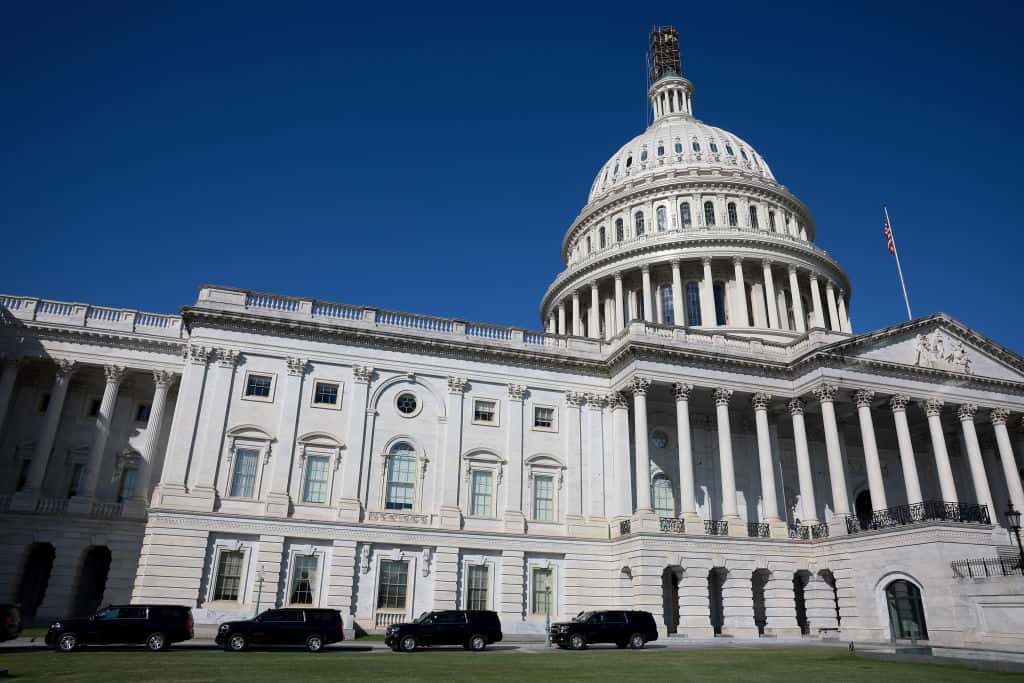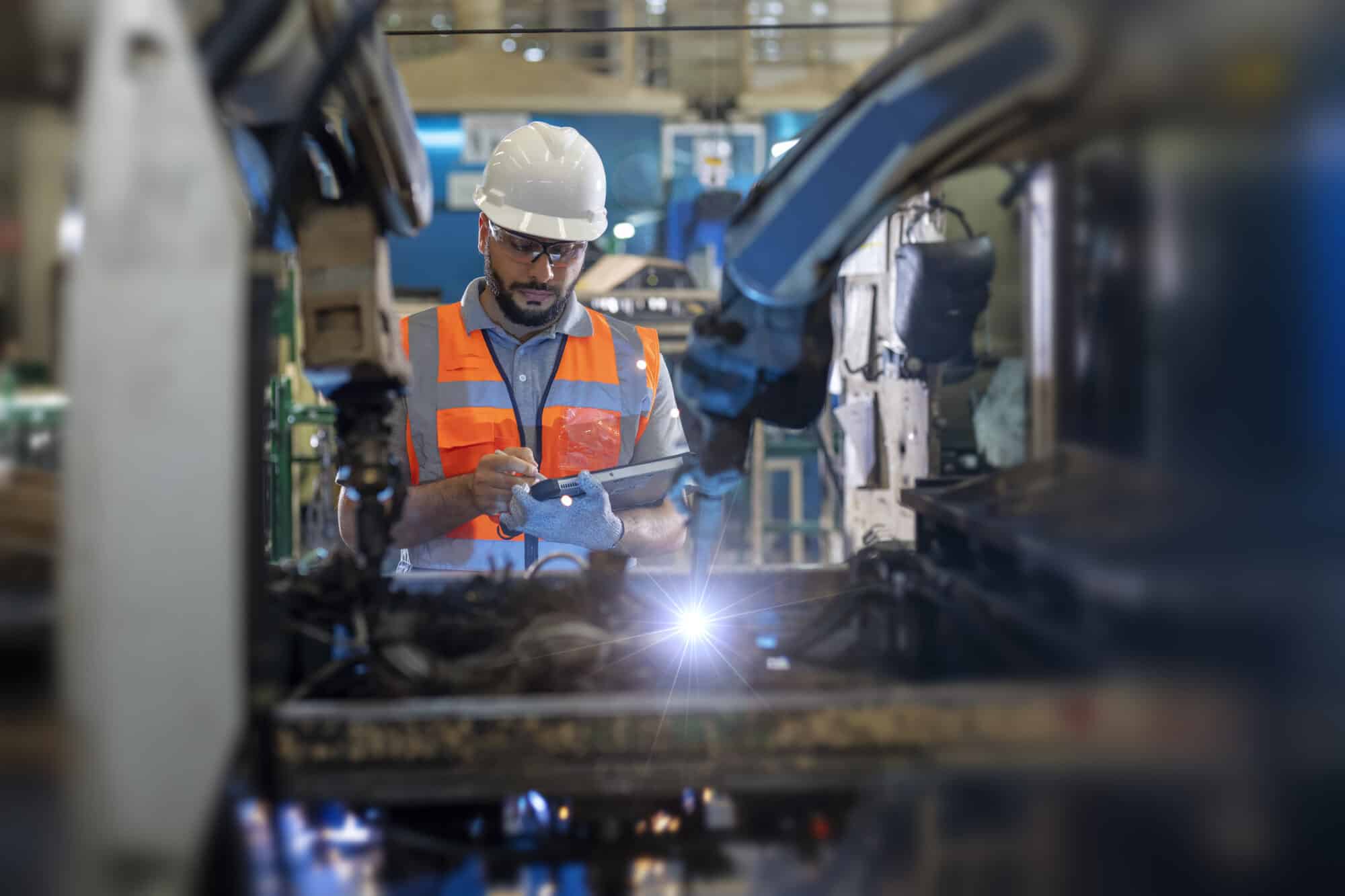Immigration Reform and Border Security Critical to Manufacturers’ Success in America
Washington, D.C. – Following the Senate introduction of the Border Act of 2024, National Association of Manufacturers President and CEO Jay Timmons released the following statement:
“For years, manufacturers have called on Congress to fix our broken immigration system, and the need for a solution at the border has only grown more urgent. This bill is neither perfect nor comprehensive, but it is important to take steps to address immigration reform and border security consistent with our plan, ‘A Way Forward.’
“Manufacturers believe the Senate’s legislation clears some critical tests: Does it make us more secure than we are today by tackling the border crisis? Yes. Does it address our ongoing worker shortage through strengthening the visa program? Yes. And does it protect democracy by supporting our allies overseas? Yes.
“Anytime Congress shows progress on sensible policy, it is a positive development for our country. The bipartisan group of Senate leaders deserves great credit for forging a plan on one of the most complicated issues facing our nation, and we appreciate the leadership’s support for this critical work.
“The NAM will work with both chambers and the administration to enact meaningful change on the critical issues of immigration and border security.”
-NAM-
The National Association of Manufacturers is the largest manufacturing association in the United States, representing small and large manufacturers in every industrial sector and in all 50 states. Manufacturing employs nearly 13 million men and women, contributes $2.85 trillion to the U.S. economy annually and accounts for 53% of private-sector research and development. The NAM is the powerful voice of the manufacturing community and the leading advocate for a policy agenda that helps manufacturers compete in the global economy and create jobs across the United States. For more information about the NAM or to follow us on Twitter and Facebook, please visit www.nam.org.
House Passage of Tax Priorities a Win for Manufacturers, Counting on Senate to Act Swiftly
Washington, D.C. – Following House passage of the Tax Relief for American Families and Workers Act of 2024, National Association of Manufacturers President and CEO Jay Timmons and Ketchie President and Owner and NAM Small and Medium Manufacturers Group Chair Courtney Silver released the following statement:
“Manufacturers thank Speaker Johnson and Chairman Smith for their leadership in passing the Tax Relief for American Families and Workers Act—and the bipartisan work in the House and Senate to secure progress for America’s manufacturing workers,” said Timmons.
“Manufacturers are now counting on the Senate to act quickly to restore these provisions that are absolutely critical to strengthening America’s competitiveness and growth of manufacturing in America,” Timmons added. “We cannot afford to wait. The cost of delay or inaction will be measured in lost jobs and slower wage growth, along with investment ceded to other countries. Passing this legislation, however, will ensure that small manufacturers, who are the backbone of communities and foundation of America’s supply chain, can continue driving our nation forward.”
“When key tax provisions expired, it wasn’t just businesses like Ketchie that felt the pinch—it was our ability to support and create jobs that took a hit,” said Silver. “I thank Speaker Johnson and Chairman Smith for their efforts to ensure passage of the Tax Relief for American Families and Workers Act. This isn’t just about numbers on financial statements; it’s about taking care of people who make things in America and work at small manufacturing companies across our country.”
-NAM-
The National Association of Manufacturers is the largest manufacturing association in the United States, representing small and large manufacturers in every industrial sector and in all 50 states. Manufacturing employs nearly 13 million men and women, contributes $2.85 trillion to the U.S. economy annually and accounts for 53% of private-sector research and development. The NAM is the powerful voice of the manufacturing community and the leading advocate for a policy agenda that helps manufacturers compete in the global economy and create jobs across the United States. For more information about the NAM or to follow us on Twitter and Facebook, please visit www.nam.org.
Small Manufacturer: Tax Legislation Restores Commonsense Provisions, Would Provide Big Jolt for Manufacturers of all Sizes
Washington, D.C. – Ketchie President and Owner and National Association of Manufacturers Small and Medium Manufacturers Group Chair Courtney Silver released the following statement calling on Congress to advance key tax priorities included in the Tax Relief for American Families and Workers Act of 2024.
“There is so much at stake for small and medium-sized manufacturers as Congress debates pro-growth tax policy, which is why I strongly support the Tax Relief for American Families and Workers Act,” said Silver. “When Congress allowed immediate R&D expensing, interest deductibility and full expensing to expire, it created a higher tax bill and tremendous uncertainty for businesses like mine. The loss of these provisions directly impacts our ability to invest in new technology, to purchase equipment and to create jobs. Nearly 90% of manufacturers share similar concerns about their higher tax burden, and if left unaddressed, our companies and our teams will have a harder time securing an edge over our global competitors.
“This legislation restores those commonsense provisions, which would be a big jolt for manufacturers of all sizes. Passing this law would give companies like ours the certainty needed to plan for growth and more investments in our future.”
-NAM-
The National Association of Manufacturers is the largest manufacturing association in the United States, representing small and large manufacturers in every industrial sector and in all 50 states. Manufacturing employs nearly 13 million men and women, contributes $2.85 trillion to the U.S. economy annually and accounts for 53% of private-sector research and development. The NAM is the powerful voice of the manufacturing community and the leading advocate for a policy agenda that helps manufacturers compete in the global economy and create jobs across the United States. For more information about the NAM or to follow us on Twitter and Facebook, please visit www.nam.org.
Manufacturing Associations Descend on Capitol Hill to Press for Renewal of Miscellaneous Tariff Bill
Washington, D.C. – Yesterday, the National Association of Manufacturers, American Chemistry Council and CropLife America, along with representatives from 16 manufacturing companies and other business and agriculture groups, joined together to meet with 17 congressional offices, including 15 lawmakers and staff on the House Ways and Means Committee, urging immediate action to renew the Miscellaneous Tariff Bill.
“Manufacturers in the U.S. cannot afford this direct economic hit and need action to be taken as soon as possible. Passing MTB legislation will increase competitiveness, spur growth and support the success of manufacturers, farmers, businesses, workers, consumers and communities throughout the U.S., said the NAM.
“The American Chemistry Council and our members support the renewal of the Miscellaneous Tariff Bill. The MTB would support advanced manufacturing in the United States and domestic chemical production used to make products in key agriculture and food production and industrial sectors, including information technology, renewable energy and automotive goods.”
“The passage of a Miscellaneous Tariff Bill that is fully retroactive would help maintain farmers’ access to the essential pesticide products they need to grow food for the U.S. and the world. A renewed MTB would mean lower input prices resulting in decreased price pressures for U.S. farmers, ranchers and consumers,” said CropLife America.
The previous MTB expired in December 2020, and since then, manufacturers and other businesses continue to pay $1.3 million per day in tariffs—that amounts to $1.5 billion over three years that should and can be invested in job creation and innovation.
-NAM-
The National Association of Manufacturers is the largest manufacturing association in the United States, representing small and large manufacturers in every industrial sector and in all 50 states. Manufacturing employs nearly 13 million men and women, contributes $2.85 trillion to the U.S. economy annually and accounts for 53% of private-sector research and development. The NAM is the powerful voice of the manufacturing community and the leading advocate for a policy agenda that helps manufacturers compete in the global economy and create jobs across the United States. For more information about the NAM or to follow us on Twitter and Facebook, please visit www.nam.org.
-CropLife America-
Established in 1933, CropLife America (www.croplifeamerica.org) represents the developers, manufacturers, formulators, and distributors of plant science solutions for agriculture and pest management in the United States. CropLife America’s member companies produce, sell, and distribute virtually all the necessary and vital pesticide and biotechnology products used by American farmers. CLA can be found on Twitter at @CropLifeAmerica.
-American Chemistry Council-
The American Chemistry Council’s mission is to advocate for the people, policy, and products of chemistry that make the United States the global leader in innovation and manufacturing. To achieve this, we: Champion science-based policy solutions across all levels of government; Drive continuous performance improvement to protect employees and communities through Responsible Care®; Foster the development of sustainability practices throughout ACC member companies; and Communicate authentically with communities about challenges and solutions for a safer, healthier and more sustainable way of life. Our vision is a world made better by chemistry, where people live happier, healthier, and more prosperous lives, safely and sustainably—for generations to come.
“March-In” Rights Would Harm Manufacturing, Economy

So-called “march-in” rights that would enable the federal government to seize manufacturers’ intellectual property are “a major threat to manufacturers in America,” according to a new seven-figure ad campaign launched by the NAM.
What’s going on: Last month, the Biden administration issued a proposal that would allow the government to take over privately held patents if those patents had been developed in part with federal research dollars.
The problem: Undermining companies’ IP rights would roll back the progress made under the Bayh-Dole Act, which allowed for commercialization of federally funded research and “unlocked all the inventions and discoveries that had been made in laboratories throughout the United States with the help of taxpayers’ money,” according to a recent op-ed in The Hill.
- Because the government is “inviting march-in petitions on every patented technology that benefited from even modest federal grants,” the proposal could “decimate American innovation [and] … stifle investment in climate change, sustainable agriculture, advanced computing, energy, medicines” and more, according to the op-ed writers, two former undersecretaries of commerce for intellectual property.
- In addition, the proposal is “putting American jobs at risk,” according to the NAM’s new ad.
The NAM says: “This radical new proposal is a major threat to manufacturers in America and counter to the president’s goals of growing the sector,” NAM President and CEO Jay Timmons said.
- “Empowering the government to march in and seize the rights to private-sector patents and technologies threatens American innovation and R&D, putting millions of well-paying manufacturing jobs at risk. Policymakers must protect manufacturers’ intellectual property rights and stop this government overreach.”
Congressional Tax Writers Unveil NAM-Supported Tax Deal

On Tuesday, Congress took an important step toward restoring three of manufacturers’ top tax priorities, as key congressional leaders unveiled a bipartisan tax agreement long sought by the NAM.
What’s going on: The $78 billion Tax Relief for American Families and Workers Act—a compromise between House Ways and Means Committee Chairman Jason Smith (R-MO) and Senate Finance Committee Chairman Ron Wyden (D-OR)—would restore immediate R&D expensing, return to a pro-growth interest deductibility standard and reinstate full expensing (also known as 100% accelerated depreciation) for businesses’ capital investments.
- The framework also includes disaster tax relief and $33 billion to partially extend a child tax credit expansion from 2021.
The background: For nearly seven decades, the tax code allowed businesses to deduct R&D costs immediately. But starting in 2022, a change required companies to amortize the costs over a period of years.
- Also in 2022, a stricter interest limitation—which acts as a tax on investment—went into effect. And last year, full expensing began to phase down.
The NAM’s role: The NAM was instrumental in the deal, having made the business case for the tax provisions’ reinstatement to lawmakers for many months, including via an ad campaign, “Keep America Resilient.”
What’s next: The NAM is urging congressional leadership to schedule a vote on the tax deal. Manufacturers can add their voices at the NAM’s Tax Action Center.
Our take: “Manufacturers appreciate Chairman Smith and Chairman Wyden’s work to reach a bipartisan tax deal with key provisions to advance U.S. economic competitiveness and support manufacturing job creation,” NAM Managing Vice President of Policy Chris Netram said in a social post Tuesday.
- “Congress must move this legislation forward immediately. The time to act is now.”
NAM in the news: Bloomberg Tax (subscription) cited the NAM’s support of the legislation, while Punchbowl News reported on the NAM’s ads in multiple Kentucky papers and Louisiana’s Shreveport Times urging support of the legislation.
ICYMI: House Members Urge Passage of Critical Manufacturing Tax Policies
Washington, D.C. – Following a series of speeches on the House floor calling for swift passage of legislation that will restore pro-growth manufacturing tax policies, National Association of Manufacturers Managing Vice President of Policy Chris Netram released the following statement:
“House and Senate tax leaders reaching a bipartisan agreement on key manufacturing priorities is a positive development—but it is only a critical first step. Now the whole of Congress must approve legislation that restores immediate R&D expensing, a pro-growth interest deductibility standard and full expensing for capital investments. Every day that they fail to act makes it more difficult for manufacturers to drive innovation and investment and hampers our ability to create jobs and raise wages in the United States.”
Below are select remarks from congressional members on the importance of restoring pro-growth tax policies.
“Since the beginning of 2022, businesses have been required to spread out or amortize R&D expenses.… Since amortization took place, the growth rate of R&D spending has slowed dramatically, from 6.6% on average over the previous six years to less than one half of 1% over the last 12 months.
“The time to address R&D amortization was at the end of 2021. The next best time is now. We need to pass R&D immediate expensing for the American people and our U.S. economy.”
“Last year, the U.K. announced its commitment to make permanent its pro-growth policy for full expensing. The U.S. should be looking to do the same to remain competitive in the global marketplace…. This is more than just an economic issue. This is a national security issue.
“How can we expect to compete with China when it is more expensive to invest, innovate and grow here in the United States of America?”
“It is imperative that we make the TCJA permanent. For example, if we cement the Tax Cuts and Jobs Act, we can reverse the current limitation on the deductibility of interest payments on business loans that will save over 850,000 American jobs.
“Another example is in research and development. While it was once a paid expense, R&D is now a cost that many small businesses cannot afford. China is subsidizing their R&D costs, giving them a huge advantage over the United States. Modernization and national security shouldn’t suffer because of an elapsed tax change. Our tax code should work for American workers and businesses and not against them.”
-NAM-
The National Association of Manufacturers is the largest manufacturing association in the United States, representing small and large manufacturers in every industrial sector and in all 50 states. Manufacturing employs nearly 13 million men and women, contributes $2.85 trillion to the U.S. economy annually and accounts for 53% of private-sector research and development. The NAM is the powerful voice of the manufacturing community and the leading advocate for a policy agenda that helps manufacturers compete in the global economy and create jobs across the United States. For more information about the NAM or to follow us on Twitter and Facebook, please visit www.nam.org.
Manufacturer Optimism Still Low

The higher tax burden being levied on manufacturers continues to hit home.
That’s the message from respondents to the NAM’s just-released Q4 2023 Manufacturers’ Outlook Survey.
What’s going on: Historically low levels of optimism persisted among small and medium-sized manufacturers—which compose the majority of the manufacturing sector—in the final quarter of 2023, according to the survey, which was conducted from Nov. 14 to Dec. 1, 2023.
- Among firms with fewer than 50 employees, 65.9% reported feeling positive about their own company’s outlook, while 63.0% of companies with between 50 and 499 employees reported the same.
- Overall, 66.2% of respondents felt either somewhat or very positive about their company’s outlook, edging up slightly from 65.1% in the third quarter. It was the fifth straight reading below the historical average of 74.8%.
Burdensome taxes: Some 89% of respondents said higher taxes on manufacturing activities would make it more difficult for them to hire additional workers, invest in new equipment and/or expand their facilities.
Other top challenges: The majority of respondents—61.1%—cited an unfavorable business climate as a top challenge to their company.
- Hiring and retaining quality employees was high on the list of challenges, too, with 71.4% of manufacturers calling it a primary concern.
A bright spot: Fewer manufacturers now expect a recession in 2024, at just over 34%. In Q3, the figure was 42.2%.
Congressional Inaction on Tax Priorities Holds Small and Medium-Sized Manufacturers’ Optimism Near Pandemic Lows
Eighty-nine percent say higher tax burdens would make it more difficult to hire, invest or expand facilities
Washington, D.C. – The National Association of Manufacturers released its Manufacturers’ Outlook Survey for the fourth quarter of 2023, showing that small companies with fewer than 50 employees and medium-sized firms with between 50 and 499 employees, which make up a vast majority of the sector, continued to have historically lower levels of optimism with 65.9% and 63.0% positivity rates in Q4, respectively.
“It’s clear that Congress’ failure to enact pro-growth tax policies to support innovation and investment before year-end is affecting the manufacturing outlook,” said NAM President and CEO Jay Timmons. “Combined with the ongoing regulatory onslaught from the Biden administration, we’re facing economic headwinds that threaten all of the bipartisan wins achieved in recent years.”
Overall, 66.2% of respondents felt either somewhat or very positive about their company’s outlook, edging up slightly from 65.1% in the third quarter. It was the fifth straight reading below the historical average of 74.8%.
The NAM has been urging Congress to swiftly restore three critical manufacturing tax policies: immediate R&D expensing, a pro-growth interest deductibility standard and full expensing (100% accelerated depreciation). These competitive tax policies are critical to empowering manufacturers to grow their operations, hire more workers, increase wages, expand facilities and invest for the future.
Key Survey Findings:
- Eighty-nine percent of respondents said higher tax burdens on manufacturing activities would make it more difficult to expand their workforce, invest in new equipment or expand facilities.
- Workforce challenges also continue to dominate the sector, with more than 71% of manufacturers citing the inability to attract and retain employees as their top primary challenge.
- A weaker domestic economy and sales for manufactured products (63.7%), an unfavorable business climate (61.1%) and rising health care and insurance costs (59.8%) are also impacting manufacturing optimism.
You can learn more at the NAM’s online tax action center here.
The NAM releases these results to the public each quarter. Further information on the survey is available here.
-NAM-
The National Association of Manufacturers is the largest manufacturing association in the United States, representing small and large manufacturers in every industrial sector and in all 50 states. Manufacturing employs nearly 13 million men and women, contributes $2.75 trillion to the U.S. economy annually and accounts for 53% of private-sector research and development. The NAM is the powerful voice of the manufacturing community and the leading advocate for a policy agenda that helps manufacturers compete in the global economy and create jobs across the United States. For more information about the NAM or to follow us on Twitter and Facebook, please visit www.nam.org.
NAM Redoubles Tax-Priority Push

With tax bill negotiations left unfinished before lawmakers left for the holiday break, the NAM is hitting the ground running in 2024.
- The NAM continues to push for manufacturers’ top three tax priorities: immediate R&D expensing, a pro-growth interest deductibility standard and full expensing for capital investments.
What’s going on: Congress has just a few weeks to reach a government funding deal before a Jan. 19 deadline, “when funding for a range of government agencies is scheduled to lapse,” according to POLITICO. There is a second funding deadline on Feb. 2.
- The NAM has been calling on Congress to prioritize inclusion of the three tax provisions in any measure it passes.
- The NAM recently led a coalition of more than 1,300 businesses and associations in highlighting the urgent need for congressional action.
What’s needed: Congress must reinstate immediate R&D expensing; loosen a strict interest limitation; and return to full expensing (also known as 100% accelerated depreciation) for businesses, the NAM said.
Why it’s important: If these fixes aren’t made, manufacturing R&D, jobs and competitiveness could all suffer.
- Some 78% of manufacturers say the higher tax burden has decreased the funds available to expand their manufacturing activities within the U.S., according to the Q2 2023 NAM Manufacturers’ Outlook Survey.
The last word: “These tax provisions are some of the most critical issues facing manufacturers today,” said NAM Vice President of Domestic Policy Charles Crain.
- “Congress must act immediately to protect manufacturing jobs and maintain America’s competitiveness on the world stage.”
Act now: Visit the NAM’s Tax Action Center to send a message directly to Congress about these critical priorities.
